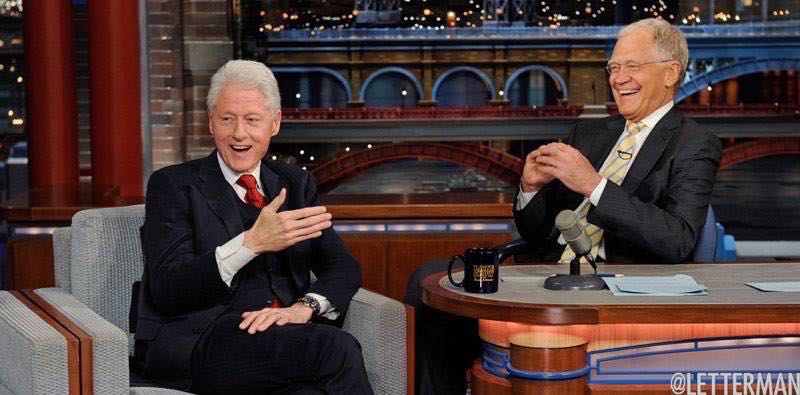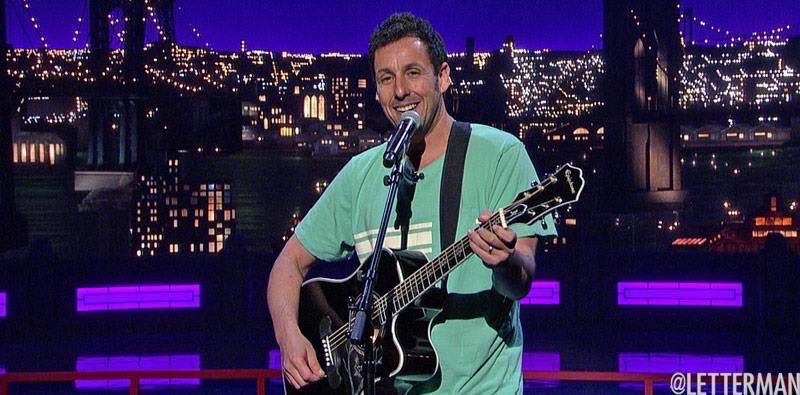
“From the infield of the Talladega Superspeedway...”
It is Episode 6,022
May 12, 2015
“And now . . . a man who makes you put down the remote control . . . David Letterman.” Dave begins with, “Six days left. I sure hope I get that call from the governor.” At the desk Dave talks about how he and Paul meet in the makeup room every day before the show and talk. Dave asks Paul to tell him the story from today. The building has added extra security to accommodate tonight’s top guest, former President Bill Clinton. When Paul was riding up the elevator with a member of Clinton’s advance team in her late twenties, Paul said, “She looks at me and she says, ‘You work here?’” Dave responds, “We can’t get off the air fast enough . . . thirty-three years, 11:30 every damn night on CBS.” The Top Ten List is “Least Popular Thomas Edison Inventions.”
The first guest is former President Bill Clinton. The band plays “Harlem Nocturne,” with saxophonist Aaron Heick taking the lead. After receiving a standing ovation, Clinton says he always had trouble playing that song. During the first segment he mentions another jazz classic, “God Bless the Child.” As they go to commercial, band memeber Felicia Collins sings the Billie Holiday song. The two songs illustrate how adaptable the CBS Orchestra is under Paul Shaffer’s direction. They could pick the perfect song for the walk-on and then change in midstream to perform a song mentioned in the interview.
Dave and the former president discuss the saxophone, his new granddaughter, and the Clinton initiative in Africa. They do not talk about Dave retiring, and there is no mention of the show ending.

Jerry Foley: The first time Bill Clinton was on the show was one of those electric moments. It was one of the few times that I witnessed someone who slightly intimidated Dave. You have two intelligent guys who were combatants in a certain sense. It wasn’t a fair fight. Dave got up there and did Lewinsky jokes like everyone else in late night every night. Then here is Bill Clinton sitting across from the guy who has mocked him. It was a tense and interesting dynamic. Clinton shows up and is confident enough that he can get past it. Dave is an artist, and his commerce is in making fun of the president. It was always a kind of validator for him when someone he has been going to town on in the public eye shows up and sits face to face with him in the same room. In subsequent appearances, it became more conversational and much more fun. They got to know each other a little bit.
Mike Buczkiewicz: I feel like Dave’s interest in politics grew toward the end of the run of the show. They touched on a number of topics. How often do you get to pick a guy’s brain like that? I think that is what Dave liked about those interviews. It was nice to see Clinton in that role, because as he got further from the office he was less guarded.
Jerry Foley: You saw that with a lot of guests who came on the show. They weren’t always as uninhibited as you wanted them to be, because there was a certain sense that when you sat across from David Letterman, you had to have your dukes up. There were people who were overly sensitive to that. Through repeated appearances things got to be more fun. Clinton is a great example of that.
The second guest is Adam Sandler. Paul plays the Warren Zevon song “Werewolves in London” for his entrance. Sandler recorded this song for a Zevon tribute album. Sandler talks about his children and tells a charming story about his grandmother, who is ninety-nine years old. He tells Dave, “When I was on Saturday Night Live and we did your show, we thought we were the coolest guys ever—Farley, Schneider, Spade, Norm Macdonald, and Rock. We were all best friends. We were in the same building as you. Every time we went to the other side of the building, where your show was, we thought, ‘I think he’s better than us.’” The baseball card shows Sandler’s first appearance as April 4, 1991.

Before moving to center stage to sing, he says, “I hate going over there. I hate leaving the couch, but I’m going over there.” Martin Short, Nathan Lane, and Billy Crystal all tried to sing the perfect tribute song. They tried to use sarcasm, they tried deep-cut Late Show references, they tried parodies. Sandler didn’t try, he succeeded. The first line is simple and, from Sandler and his generation’s perspective, totally true: “There simply is no better man/than our David Letterman.” The tune begins as a typical Sandler tune, one that sounds simplistic, but as the song progresses it becomes more rooted in a true acoustic rock song.
The lyrics become less jokey and more heartfelt as the song continues. He hits the classic moments of Dave’s career, cracking jokes about Julia Roberts, Stupid Pet Tricks, Les Moonves, and speeding tickets. By the end of the song, Sandler has transitioned from silly to true sentiment, singing that he hopes the cop who pulls Dave over for speeding “drags you back here for thirty more years.” He frantically strums the guitar as the music builds, and the audience screams with agreement.
He brings the song back down to say Dave is “the King of Comedy and our best friend on TV.” Dave comes to greet him, and while the audience stands and cheers, Adam whispers, “I love you, Dave.” It truly is a touching moment. Writing it out doesn’t do the performance justice. YouTube it and watch a perfect tribute.
Jerry Foley: I can tell you the difference between Adam’s song and Nathan’s or Marty’s. They are more Dave’s contemporaries. Given the age difference, Adam Sandler is a true fan. How long had Dave been at it before Adam became Adam? There is a meaning to Adam’s song that wouldn’t be possible for older performers. Adam grew up with Dave. Bill Scheft had a line for a lot of these younger comedians and performers for a whole generation: “Dave came with the TV.” Adam’s song was right up there with [the upcoming performance of] Norm Macdonald as being something deeply felt.
Bill Scheft: Adam Sandler did an absolutely note-perfect, in-character song for Dave. No matter how many times I try to tell Dave, he refuses to accept or acknowledge the two generations of comics he either influenced or who aspired to make it onto his stage, absolutely refuses to do it. Maybe with the time and critical distance coming up he can.
Barbara Gaines: We felt bad that Adam came after President Clinton because he only got four minutes for talk and four minutes for a song. He really got no time. President Clinton got fifteen. That was how those shows went. People didn’t get their regular time.
Sheila Rogers: People were totally cool about that. And that is unusual. Normally you hear they have to be the lead guest. As we got to these last six weeks of shows, people didn’t care so much. They were like, “Fine, I just want to be on the show.” Adam was fine following Bill Clinton. He did the song and couldn’t have been more gracious and wonderful.
Brian Teta: When you think of a late-night tribute song, you think of Johnny Carson and Bette Midler, and that is so not Dave. We thought there was gonna be a bunch of songs they are gonna want to sing to him, but they have to be funny. Marty Short is, of course, going to do one. Billy Crystal and Nathan Lane did one. Then Adam wanted to do one. I wouldn’t say I was nervous about it, but as soon as I heard it I was like, “We have to let this happen.” It was fantastic. I don’t think Dave heard it until it aired. Adam did it in rehearsal for us. We knew it was gonna be great. Adam wrote it with a writing partner. It was sincere and it was definitely praising Dave, but it was funny enough that it was OK, and Dave could sit there and take it. I am not even sure I told Dave it was happening till right before it happened: “Adam is gonna sing to you, bye.”
Worldwide Pants Tag: “Pants are fun.”